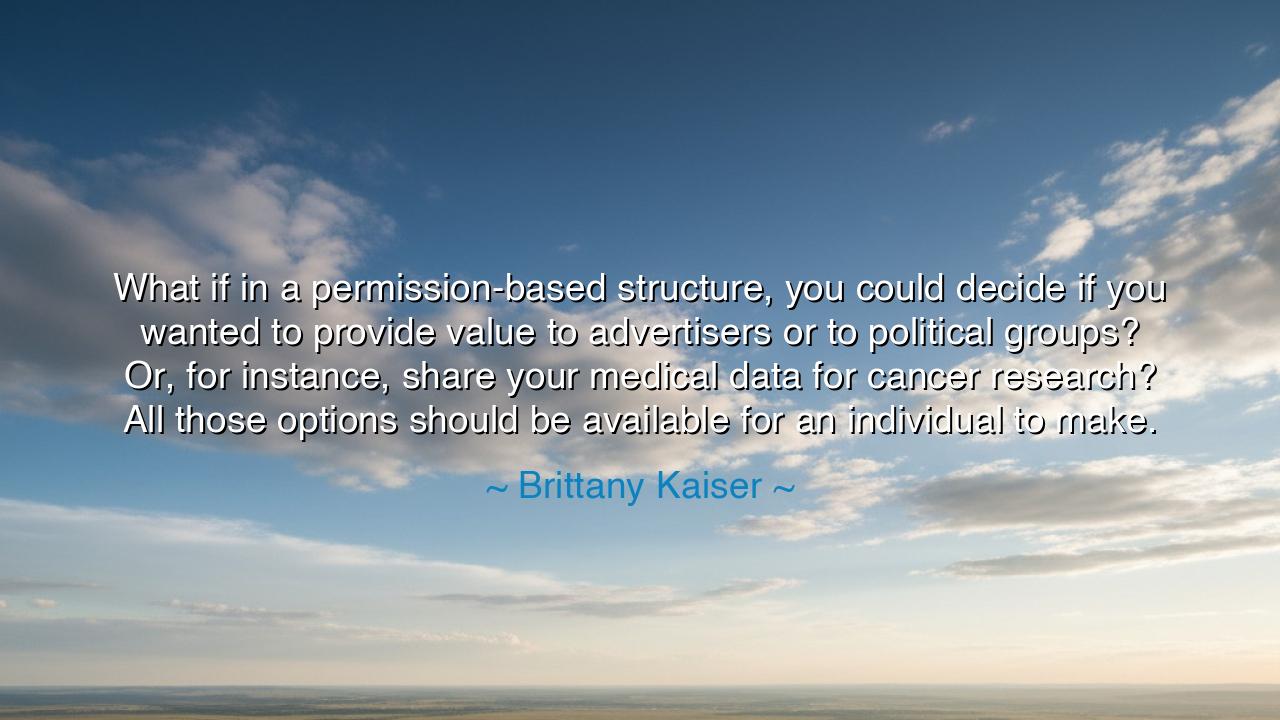
What if in a permission-based structure, you could decide if you
What if in a permission-based structure, you could decide if you wanted to provide value to advertisers or to political groups? Or, for instance, share your medical data for cancer research? All those options should be available for an individual to make.






The words of Brittany Kaiser—“What if in a permission-based structure, you could decide if you wanted to provide value to advertisers or to political groups? Or, for instance, share your medical data for cancer research? All those options should be available for an individual to make.”—speak to one of the most urgent moral questions of the modern age: the question of freedom in the age of information. Her words are not merely a vision for technology, but a defense of human dignity in a world where data has become the new lifeblood of power. In her vision, the right to choose—to say yes or no, to give or withhold, to share or to protect—is the essence of sovereignty. For what is liberty, if not the power to decide what of oneself may be known, traded, or trusted?
To understand this quote is to understand the struggle between consent and control that defines the digital era. In the ancient world, power was measured in land, armies, or gold; in our time, it is measured in data—those invisible traces of who we are, what we think, and what we desire. Corporations and governments, like the empires of old, seek to gather this resource and shape the will of the people through it. But Kaiser, once a figure within that machinery herself, saw the peril of a world where individuals become products rather than participants. Her words call for a new kind of justice—a permission-based structure, where the flow of information is guided not by exploitation, but by choice. It is, in essence, a call for the restoration of personal agency in an age that too easily forgets it.
The origin of this quote lies in Kaiser’s own transformation—from a director at Cambridge Analytica, a company known for its manipulation of political data, to a whistleblower and advocate for digital human rights. Having witnessed firsthand how personal information was used to sway elections and control thought, she emerged as a voice of conscience. Her question is not rhetorical—it is revolutionary. She asks: what if the individual could reclaim dominion over their own data, choosing whether to give it freely for noble causes, like medical research, or to keep it guarded from those who would twist it for profit or persuasion? In asking this, she offers a vision of the digital world not as a cage, but as a covenant—an agreement founded on respect and autonomy.
Her message echoes the timeless wisdom of the ancients, who taught that freedom without understanding is merely another form of bondage. The philosopher Epictetus, once a slave himself, said, “No man is free who is not master of himself.” In the digital age, mastery of oneself extends to mastery over one’s data—one’s digital reflection. Just as the ancients fought for control over their bodies and their labor, so must we now fight for control over our digital selves, those fragments of our identity scattered across networks and servers. To live without such control is to live in illusion, for a person who cannot choose what of themselves to share has already surrendered part of their humanity.
Kaiser’s inclusion of medical data in her example reveals the paradox of this age. The same data that can cure diseases and save lives can also be weaponized—sold to advertisers, insurers, or political manipulators. She envisions a world where technology becomes not a thief of privacy, but a partner in progress—where a person may choose to share their information for the betterment of mankind, not under coercion, but under informed consent. This idea recalls the spirit of Hippocrates, the father of medicine, who taught that the healer’s first duty is to do no harm. The same principle must now guide the keepers of data: that the collection of human information must serve life, not exploit it.
Throughout history, every era has faced a moment when it had to decide whether technology would serve humanity or enslave it. When Prometheus stole fire from the gods, he gave mankind power, but also danger. Fire could warm or destroy; it was not the flame itself that was moral or immoral, but the hand that used it. Data, too, is such a flame. It holds the power to enlighten civilization—to end disease, to unite communities, to reveal truth—but without consent, it becomes a tool of control, burning the very hands it was meant to empower. Kaiser’s vision is a call to temper power with wisdom, progress with ethics, and innovation with the sanctity of choice.
From Brittany Kaiser’s words, let every person learn this sacred lesson: that autonomy is the foundation of all dignity. To protect one’s right to choose—how to speak, how to share, how to exist—is to protect the very essence of what it means to be human. The world she imagines is not a distant dream but a duty for all who believe that freedom must evolve with technology. We must demand transparency, create systems that honor consent, and ensure that every person, not every corporation, holds dominion over their digital soul.
So let her question echo through the generations like an ancient oracle’s challenge: What if you had the power to decide how your life’s data is used? For the answer to that question will define not only our future, but our very humanity. Let us build a world where information serves integrity, where innovation serves compassion, and where every act of sharing is an act of will, not submission. For when the individual becomes once again the master of their choices, then—and only then—will the age of technology truly become the age of wisdom.






AAdministratorAdministrator
Welcome, honored guests. Please leave a comment, we will respond soon